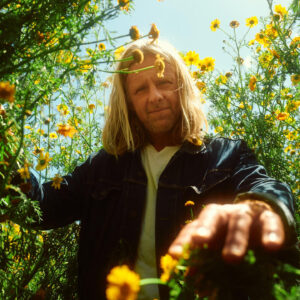John Mendelssohn grew up in Los Angeles, wrote for Rolling Stone, and was frontman for two critically acclaimed L.A. bands (Christopher Milk and The Pits).
Even though Mendelssohn stands on the shoulders of giants like Cole Porter and Rodgers & Hammerstein, his songs have the unmistakable stamp of originality. His latest release “God’s Waiting Room” is powerfully moving – the antithesis of the “bedroom pop” that dominates today’s Spotify playlists.
Mendelssohn is now an American expat living in London. His views on pop music are imbued with candour, humour and all those other words that the Brits spell differently.
What prompted you to write “God’s Waiting Room”? Do you have fears of winding up in a place like that?
I saw The Father, starring Anthony Hopkins, and it broke my heart. There was a scene in which he heard someone going into his living room, and he was terrified. Then we found out that the person in the living room was the son-in-law (or something) with whom he lived. Having done so as a child, I could easily picture how excruciating it would be to live in perpetual terror, which is the fate to which dementia condemns many of us. Before seeing that film, I was content to imagine that a little mild confusion was as bad as it got. I do indeed dread winding up in that situation.
How has your songwriting changed since the days of Christopher Milk and The Pits? Is it more wide-ranging and introspective now?
In the CMilk era, I didn’t really know how to compose music, as witness the one song I wrote alone on our album (“Poor Baby”) in which pretty nearly every note in the melody gets a new chord because I hadn’t heard of the miracle of passing tones. 🙂 When I figured it out, I aspired to be Cole Porter – to combine beautiful melodies and smart lyrics. That 99 percent of the people who hear my stuff compliment the lyrics and say nothing about the melodies, which always come first, drives me crazy. In pop music, I think the melody is far more important, and I like to imagine I have as much a flair for melody as for lyrics. I aspire to Paul McCartney-esque tunefulness. He has a knack for composing novel melodies that somehow feel familiar. (Of course, so does Jeff Lynne, whose work I avidly loathe).
Also, from the very beginning, I had no interest in being only clever, and wanted to write songs that would break the listener’s heart. I HATE when people say, “Your stuff is so funny.” Half the reason I got shown the door by the band that morphed into Sparks was that I objected to their relentless cuteness.
The Pits’ repertoire contained “You’re the Pits” (my answer to Cole Porter’s “You’re the Top”), but it also contained “Autumn Approaching”, and I defy anyone to name a more beautiful song about romantic loss.
I’ve always been a big admirer of craft – in detailed melodies and lyrics that manage to affect while still rhyming. Wine and time do NOT rhyme, any more than Bb and B are the same note. Bad rhymes sound like out-of-tune notes to me. I never bought one of his records, and always found him a little too self-delighted, but I admired Billy Joel’s craftsmanship enormously. “I don’t care what consequence it brings/ I have been a fool for lesser things.” That’s the standard to which I aspire. The problem with my Tin Pan Alley heroes is that they were usually writing fiction, and I aspire to being heartfelt at least 50 percent of the time.
Now that we have some perspective on the ’60s and ’70s, what artists do you think were the most groundbreaking in that era? Has the Ray Davies legacy grown larger, while The Beatles’ work is now viewed as 50% dreck, etc.? (Note: Most Millennials subscribe to the “50% dreck” view.)
Dunno about groundbreaking. By that, do you mean novel? I suppose Mr. Dylan, in his amphetamine-fueled mid-20s, was pretty groundbreaking. But I’ve never been very interested in novelty, as I’ve never been very interested in…chops. A beautiful melody gets me every time, and if evocative words are riding on it, I’m in. I thought Mr. Davies’s big innovation was writing about hopelessness in a way that felt more authentic than, say, Carole King (in “We Gotta Get Out of This Place”). I honestly can’t remember a song of his I’ve liked in over 50 years, though. It seems to me he essentially gave up on melody.
I see that The Kinks are reuniting. What a spectacularly awful idea. Three men in their late 70s, the main one of whom hasn’t written a good song in this century.
Songs I adore: “Bewitched, Bothered and Bewildered”. “Bali Hai” (from South Pacific). “Someone to Watch Over Me”. “O Danny Boy”.
As for The Beatles, well, I think pop music is all about evocation, and evocation is all about sound. I think the Beatles sounded quite wonderful through Revolver, when they were channeling the Everlys a lot. Their most embarrassing moments came when they said, ‘Let’s do one of George’s.’ “Blue Jay Way” is the second-worst song in human history, after “Sweet Home Alabama” (and Tom Petty’s entire repertoire!).
What’s your favorite thing about living in London…and also your least favorite?
There isn’t much I like about London, which bears no resemblance whatever to the place I first visited in 1972. It absolutely vibrated with excitement then. It could hardly be duller now. I do enjoy our tiny house’s proximity to a very pretty stretch of the Thames, and do have a happy marriage to an avowed Englishwoman. I didn’t want to live in a country over which Donald f***ing Trump presided. I loved living in LA for 30 months beginning in 2013, but couldn’t afford it. I haven’t set foot in my own country since September 2015.






